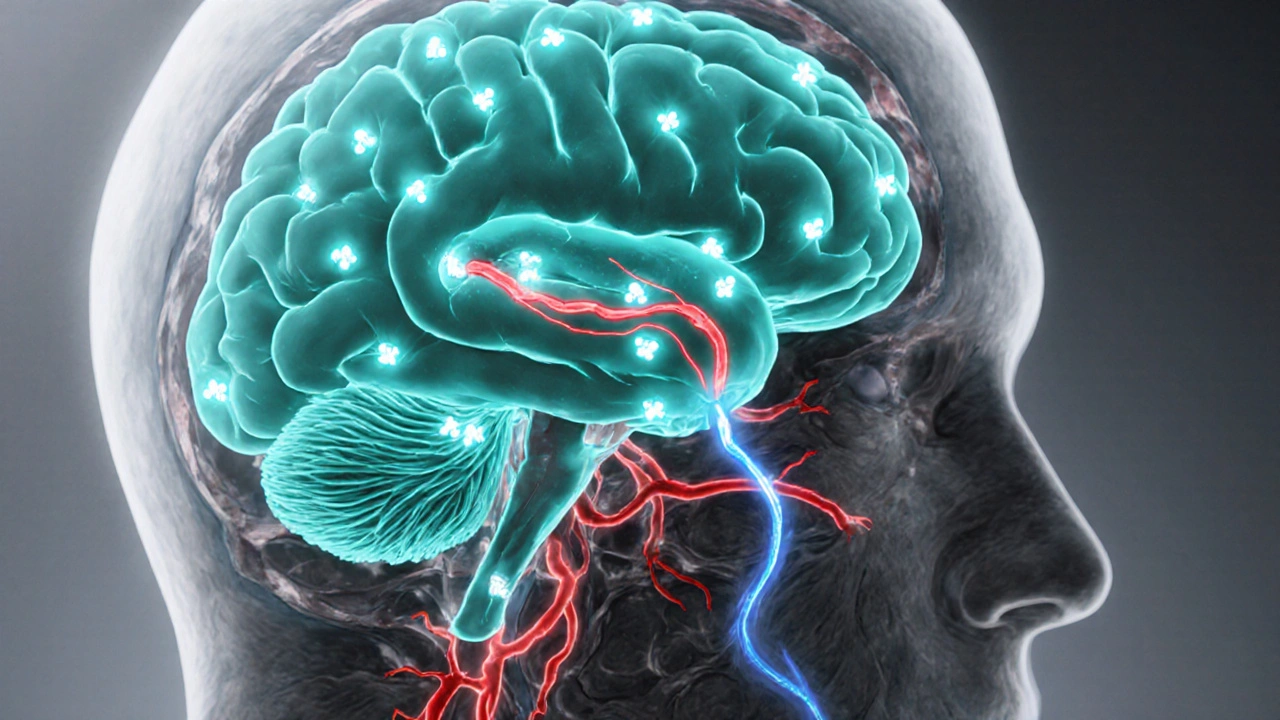Hydration & Cognitive Performance Calculator
Your Hydration Profile
Cognitive Impact Assessment
Cognitive Performance Impact
Personalized Hydration Recommendations
When you feel an urgent need to drink water, it’s more than just a tiny annoyance - it can mess with the way your brain works. Understanding why that dry mouth drags down focus, memory, and overall mental sharpness can help you stay on top of daily tasks without the fog.
What "increased thirst" really means
Thirst is a physiological drive that signals the body’s need for fluid replacement. It is triggered by rising blood‑osmolarity, reduced blood volume, or hormonal cues such as vasopressin. When this signal intensifies beyond normal levels, we call it increased thirst, often a early sign of mild dehydration.
How the brain monitors hydration
The brain’s hypothalamus houses osmoreceptors that constantly measure the concentration of solutes in the blood. A 1% rise in plasma osmolarity can fire these receptors, prompting the sensation of thirst. At the same time, the hypothalamus releases antidiuretic hormone (ADH) to conserve water via the kidneys. When fluid intake doesn’t catch up, the body shifts into a conservation mode that directly affects neuronal activity.
Dehydration’s ripple effect on brain performance
Even a 2% loss of body water-a level many people reach after a typical workday without enough drinks-has measurable consequences:
- Reduced cognitive function across tasks that require attention, memory, and problem‑solving.
- Slower reaction time by up to 30% in demanding situations.
- Impaired mood regulation, often leading to irritability or anxiety.
These changes stem from three core mechanisms:
- Cerebral blood flow drops as blood volume shrinks, limiting oxygen delivery to neurons.
- Electrolyte imbalance-especially sodium and potassium-disrupts the electrical signaling essential for synaptic transmission.
- Altered neurotransmitter synthesis; for instance, lower acetylcholine levels compromise memory encoding.

Key research findings
A 2023 double‑blind study from the University of Cambridge evaluated 48 adults performing a series‑of‑tasks battery under three hydration states: fully hydrated, mildly dehydrated (2% body‑water loss), and moderately dehydrated (4% loss). Results showed:
| Domain | Fully Hydrated | Mild Dehydration | Moderate Dehydration |
|---|---|---|---|
| Working memory (n‑back test) | 92% accuracy | 85% accuracy | 78% accuracy |
| Attention (psychomotor vigilance) | Mean reaction 250 ms | Mean reaction 285 ms | Mean reaction 320 ms |
| Executive function (Stroop test) | 90% correct | 82% correct | 74% correct |
The authors concluded that a mere 2% drop in hydration already impairs mental clarity enough to affect everyday decision‑making.
Real‑world examples
Think about a morning meeting after a night of limited water consumption. Many report “brain fog” that mirrors the lab‑based findings. Athletes, pilots, and surgeons-all professions where split‑second decisions matter-have documented performance dips when fluid intake falls short.

Practical steps to keep thirst from hijacking your brain
Below is a quick checklist you can apply at work, school, or home:
- Start the day with 250 ml of water before any coffee or tea.
- Carry a reusable bottle and sip every 20-30 minutes.
- Set a gentle reminder on your phone for hourly hydration checks.
- Eat water‑rich foods like cucumber, watermelon, and oranges.
- Monitor urine color; pale yellow signals adequate intake.
- Adjust fluid needs in hot weather or after vigorous exercise-aim for an extra 500-750 ml.
If you notice persistent cravings despite meeting these guidelines, it could be a sign of underlying issues such as diabetes or medication side‑effects. In that case, a brief chat with a healthcare professional is worth it.
When increased thirst becomes chronic
Chronic mild dehydration-common among office workers who rarely leave their desks-can lead to longer‑term cognitive decline. A longitudinal study spanning five years linked consistently low daily water intake (<1.5 L) with a 12% faster rate of age‑related memory loss compared to peers drinking ≥2 L.
Beyond cognition, prolonged dehydration raises the risk of kidney stones, constipation, and cardiovascular strain. The brain isn’t the only organ feeling the pinch.
Frequently asked questions
How much water should I drink to keep my brain sharp?
General guidelines suggest 2-3 liters (8-12 cups) per day for most adults, but individual needs vary with weight, activity level, and climate. Aim to replace any fluid loss within a few hours of sweating or intense focus.
Can coffee or tea replace water for hydration?
Caffeinated drinks have a mild diuretic effect, but in moderate amounts they still contribute to overall fluid balance. Pair them with plain water to avoid a net loss.
Does drinking water improve memory instantly?
A single glass can boost attention within 10-15 minutes, but significant memory benefits accrue from sustained, adequate hydration over days and weeks.
What signs indicate I’m dehydrated beyond just thirst?
Dark urine, dry skin, headache, dizziness, and rapid heartbeat are common early warnings. If you notice these alongside a persistent need to drink, step up fluid intake immediately.
Are there foods that help keep the brain hydrated?
Yes. Fruits and vegetables with high water content-such as strawberries, celery, and cantaloupe-contribute both fluid and electrolytes, supporting neural function.
Bottom line: Ignoring that nagging thirst does more than make your mouth dry-it quietly sabotages the very mental clarity you need to work, learn, and enjoy life. By treating hydration as a non‑negotiable part of your daily routine, you protect your brain’s fast‑acting circuits and keep performance steady, rain or shine.


Comments
When you start feeling that gnawing thirst, it’s not just a nuisance – it’s your brain waving a red flag. The hypothalamus immediately picks up the rise in plasma osmolarity and flips the switch for ADH release, which in turn conserves water but also subtly throttles neuronal activity. Even a modest 2% drop in total body water can shrink cerebral blood flow enough to starve neurons of oxygen, and that’s where the fog rolls in. Electrolyte imbalances, especially sodium and potassium shifts, throw off the electrical gradients that power synaptic firing, so you start noticing slower reaction times and a hazy mental picture. Lower acetylcholine synthesis further derails memory encoding – that’s why you might forget a name you just met. In practice, you’ll see a dip in working‑memory scores on an n‑back test, longer reaction times on vigilance tasks, and poorer performance on the Stroop test, just like the Cambridge study highlighted. The good news is that the brain is remarkably resilient; a quick sip can reverse many of these effects within minutes. Hydration isn’t just about quenching thirst, it’s about maintaining the precise ionic environment that keeps our neurons humming. For office workers, a simple habit of drinking 250 ml of water first thing in the morning can set the tone for the day. Keep a reusable bottle at your desk and take a sip every 20‑30 minutes – you’ll notice the difference in focus before you know it. Add water‑rich foods like cucumber or watermelon to your snacks; they contribute to overall fluid balance without the need to constantly refill a cup. Monitoring urine color is a low‑tech way to gauge hydration – pale yellow is the sweet spot. In hot weather or after a workout, bump your intake by an extra 500‑750 ml to offset sweat losses. If you find yourself constantly craving water despite these measures, it could be a red flag for underlying health issues like diabetes or medication side‑effects, so a chat with a healthcare professional is wise. Finally, remember that chronic mild dehydration can accumulate, potentially accelerating age‑related cognitive decline, so treat those thirst cues as early warnings rather than optional reminders.
Wow, staying hydrated really does clear the fog! 😊
From a neurophysiological standpoint, osmotic homeostasis is a pivotal modulator of synaptic efficacy. The marginal hypovolemia observed at a 2% dehydration threshold precipitates a measurable decrement in cortical perfusion, which is corroborated by functional MRI studies. Concurrently, electrolyte dysregulation – particularly hyponatremia – attenuates the amplitude of action potentials, thereby impairing rapid information processing. It’s also worth noting that vasopressin’s antidiuretic action, while conserving fluid, can exacerbate cerebral edema in susceptible individuals, further compromising cognition. In sum, the cascade from peripheral fluid loss to central neural compromise underscores the necessity of vigilant hydration protocols.
Listen up, folks – if you think you can power through a meeting on empty, you’re basically asking your brain to run a marathon with a busted tire. The hypothalamus isn’t playing games; it’s screaming for water, and your prefrontal cortex feels that as pure, unfiltered sluggishness. You’re not just a little “tired”; you’re operating at a fraction of your true capacity. Bottom line: drink water, stay sharp, and stop pretending you’re fine when you’re clearly not.
Hydration hacks are gold, especially during tight deadlines,; keep a bottle handy, sip consistently,; and watch your focus skyrocket! 🚀
Ever wonder why big water corporations push the “drink eight glasses” myth? It’s a classic market‑control strategy to keep us buying bottled water. They profit while we suffer mild dehydration, because the subtle cognitive dip makes us less likely to question authority. Stay vigilant.
Sure, the “water cartel” narrative sounds dramatic, but the science on dehydration is solid and independent of any marketing agenda. Just drink more water – it’s simple.
Patriotic citizens must recognize that optimal cognitive performance is a national security issue. When our workforce is under‑hydrated, productivity plummets, and that weakens our economic standing on the global stage. The data clearly shows a direct correlation between water intake and mental acuity, so any policy that neglects hydration education is fundamentally irresponsible. Moreover, dismissing these findings as “minor” is an affront to scientific rigor and to the very fabric of our nation’s competitiveness. It’s time to prioritize hydration initiatives in schools and workplaces alike.
Ah, the good ol’ “stay hydrated” mantra – because nothing says “I care” like a water bottle with a smiley face. 😂 Keep those emojis flowing along with the H₂O!
i think we must reflecgt on the deeper meaning of thirst, its like a symbol of life itself, yet we ignore it becuse of our busy lives. the mind is alwayes seeking clarity, and water is the key, no? anyway, drink more water and think better.
Honestly, if you’re not carrying a water bottle everywhere, you’re just setting yourself up for mental mush. Get it together.
While the average commenter may oversimplify, let’s not forget that the nuanced interplay between osmoregulation and neurotransmission warrants a sophisticated discourse. That said, kudos for bringing attention to a topic that often slips through the cracks of everyday conversation.
Let me set the record straight: any suggestion that mild dehydration is a trivial inconvenience is outright falsehood. The American brain consumes about 20% of the body’s oxygen, and even slight reductions in cerebral perfusion - which occur with as little as a 2% loss in body water - result in measurable declines in executive function, working memory, and reaction time. This isn’t just academic; it has real‑world implications for our nation’s competitiveness, from boardrooms to battlefields. When soldiers or pilots are compromised by preventable fluid deficits, national security is at stake. Moreover, the corporate sector suffers as productivity drops, directly affecting GDP growth. It’s incumbent upon policy makers to mandate hydration education in schools, implement water‑access programs in workplaces, and fund further research into the long‑term cognitive impacts of chronic mild dehydration. Ignoring this evidence is tantamount to intellectual negligence, and it undermines the very foundation of our society’s progress.
It’s fascinating how something as simple as a glass of water can echo broader philosophical themes of balance and self‑care. By nurturing our bodies, we also nurture the mind’s capacity for deeper reflection. Let’s keep the conversation flowing, just like good hydration.